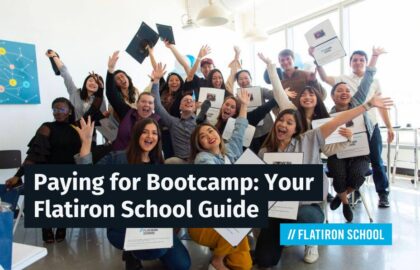This article on the informational interview is part of the Content Collective series, featuring tips and expertise from Flatiron School Coaches. Every Flatiron School graduate receives up to 180 days of 1:1 career coaching with one of our professional coaches. This series is a glimpse of the expertise you can access during career coaching at Flatiron School.
When embarking on a new career, it’s not always clear in which direction one should – or can – go. This is especially true for the tech field. With a variety of tech verticals that cater to niche interests and needs, paired with the sometimes minute differences between roles with similar functions, it can be overwhelming to decide which opportunities to pursue.
To this end, it is generally a good idea to seek advice from those who have gone before. While you could mine the internet, read relevant articles, and listen to countless podcasts in your effort to select a path forward – the best way to get real, honest advice on what it’s like working in the tech industry is direct from the source with an informational interview.
What Is An Informational Interview?
An informational interview is an informal conversation in which a person seeks insights on a career path, industry, company, or general career advice from someone with experience and knowledge in a specific area.
By conducting an informational interview you’ll discover what a person’s job is like, what responsibilities they have, what it is like to work at their company, and insight about their industry overall.
Why Is It Important To Do Informational Interviews During A Job Search?
Doing an informational interview is taking the “look before you leap” approach to career planning. While an informational interview cannot give you the full picture of working in a particular role, company, or industry, it can give you valuable insight into whether or not it would be a good fit in general.
People who do informational interviews before taking major career steps have less likelihood of looking back on their career and saying “If I had only known, I would have done things differently.”
An informational interview will reveal aspects of a role you may have yet to consider and may take you in another direction. Alternatively, your conversation partner may confirm that the role/company/industry is exactly what you want, and you can proceed down the path you began on secure in your decision.
Whether you have your heart set on a certain career trajectory or are still unsure of what type of path you’d like to take, informational interviews help to alleviate the “what if’s” that so often linger in the mind before, during, and after a career move.
How To Set Up An Informational Interview
When setting up an informational interview, it’s natural to feel apprehensive about reaching out to people. You may be thinking – “Why would they want to talk with me? What do I say? What if they say no?” These are all reasonable thoughts, but once you get started, it’s easier than you think. And here’s a secret: people generally do want to help those coming up behind them!
Here are some things to keep in mind and how exactly to reach out to prospective conversation partners for an informational interview:
Prepare Your Mindset
Despite people generally being happy to help, it’s important to begin your reach outs knowing that not everyone will say yes or even respond, and that’s okay.
People are busy, and they may not have time to participate. Or, they may simply not want to. Any reason they have to decline is valid, and never push it. Set out expecting a fairly low response rate, but don’t let that discourage you. It’s not the quantity of conversations that matters, but the quality of them.
Understand Your Goal
It’s critical to remember that an informational interview is not a job interview. This meeting is not about securing a job opportunity. Instead, your aim should be to glean relevant information and build a relationship with your conversation partner.
Don’t worry about “selling yourself” as one does in a typical interview. Instead, be authentic about your career goals, desired path, and your personality. Only by being authentically yourself will your partner be able to help determine which parts of a role you’d like or dislike.
Source Prospects From Your Network
To set up an informational interview, first determine who in your network may have done the sort of work you’d like to, or been employed in a company or industry that interests you. Consider your friends, family members’ friends, past colleagues, people from high school or college, neighbors, and those in communities in which you are a participant.
If you’ve exhausted your network, consider finding alumni from your high school or post-secondary educational institution. Use LinkedIn to search for people who belong to the same professional associations, have similar interests, have had similar previous roles, or are currently in a role that interests you.
Craft A Message
Once you’ve found someone you’d like to talk to, it’s time to make the ask.
In many cases, sending an email is a great option, but this can depend on how well you know this person and how you typically communicate. If the contact is someone you know well, calling or asking in person works just fine. No need to make a formal appointment for an informal conversation.
But for those whom you are not familiar with, an email or LinkedIn message is often the best way to reach out.
Here are some things to keep in mind and to include in your message:
- Why are you reaching out?
- What about them or their experience would you like to learn more about?
- Why are you reaching out to this person specifically? Maybe they created a project of interest to you, they live in the same city, went to the same school, or they made a career transition that you would like to emulate.
- When, where, and for how long would you like to meet? Give them options to choose from, on different days and at different times. It is best practice to ask for no more than 15 minutes, though it may naturally run over during the discussion.
Sample Message
Here is an example message that one of the graduates I worked with sent and had good results with:
“I’m an independent musician turned software engineer. I know it’s a crazy time right now, but I would like to ask you some questions about your experience in software engineering.
Specifically, I’m curious about:
- What skills or attributes do you think are most important for a bootcamp grad to demonstrate when looking for the first software engineering job?
- The first project or projects you worked on when you started your first engineering role.
Would you be up for a quick call this week or next to chat? I can set up a Zoom call or we can talk on the phone, whichever you’re more comfortable with.
Also: I really like the Nox song ‘Second Encounter’. I love a well-placed spoken-word sample.”
In this message, we can see that the sender reviewed the recipient’s background and resonated with it, and found that they shared common interests to include as well.
Each message you send out should be different because each person’s background, interests, and the type of advice you may be seeking from them will be different. Don’t just mass-message – always personalize!
Follow Up
If you don’t hear back, reach out again after 5 business days. Many times people are busy and want to respond, but put your message in a folder and forget about it.
Keep your follow-ups brief and give them an out.
For example: “I realize you are very busy and this message may have slipped through your inbox. If you would be open to talking further when you are free let me know. If not, I understand and I wish you the best” and you can simply put the same message you had previously sent in the email. This allows the second message to be seen without a sense of pressure to respond.
How To Prepare For An Informational Interview
Once you have an informational interview set up, it’s time to prepare. Remember, an informational interview is about developing a relationship, not just about having a one-time conversation.
Conduct Background Research
While the focus and depth of your background research will vary depending on whether you’d like to ask about this person’s specific journey or simply working in their field in general, you must do research before your scheduled interview.
You’ve likely done some surface-level research on the person you’re going to meet with before reaching out, now is the time to go deep. Look at their background, previous roles, current role, degrees, projects, LinkedIn posts, etc. Anything that might inform the questions you ask about their background and career trajectory. Research their company and industry, and make notes of things you are curious about.
Develop Questions
Consider what questions you may like to ask, such as:
- What are your most favorite and least favorite parts of your role?
- What projects are you working on right now?
- Now that you have been in your career for a while, what would you do differently if you were to start over?
Don’t feel like you have to select questions from a list and stick to them, allow the conversation to flow naturally and clarify new topics and points that will inevitably come up throughout it.
During The Interview
Next is conducting the informational interview. Don’t be nervous – remember, they’re here to help you!
Show You’ve Done Your Research
To begin your conversation, share something you’re impressed with about their background, preferably highlighting an area that you intend to ask questions about. This will steer the discussion in the right direction from the beginning.
Ask Additional Questions When Relevant
Have your prepared questions handy, but don’t allow the conversation to feel like a battery of questions. Listen politely, ask for clarification, and let the conversation flow naturally. Take notes as appropriate, but focus on the person in front of you.
Stay Aware Of The Time
Be cognizant of the other person’s time and don’t run too far over.
If you’re nearing the end of the allotted time slot and the conversation is still flowing you can say something like: “You agreed to meet with me for 20 minutes. I want to be courteous of your time – do you have time to continue talking or should we conclude?”
Follow Up After The Informational Interview
Within 24 hours of your information interview, follow up with a thank you note. Thank them for taking the time to talk to you, and share insights you found particularly valuable from the conversation.
Be sure to stay in touch afterward and touch base regularly, giving them updates on how you’ve implemented their advice (if relevant). Should you hit a career milestone or land a new job relevant to your conversation, be sure to thank them for their support and knowledge in getting you to where you are today.
About Laura Nicolaisen
Laura Nicolaisen is a Career Coach with Flatiron School. She has 15-plus years of experience as a career coach collaborating with recent graduates, professionals, and executives. In addition, Laura has over 15 years of experience working in the university and bootcamp setting, in such areas as admissions, student advising, coaching, and as an executive team member.




